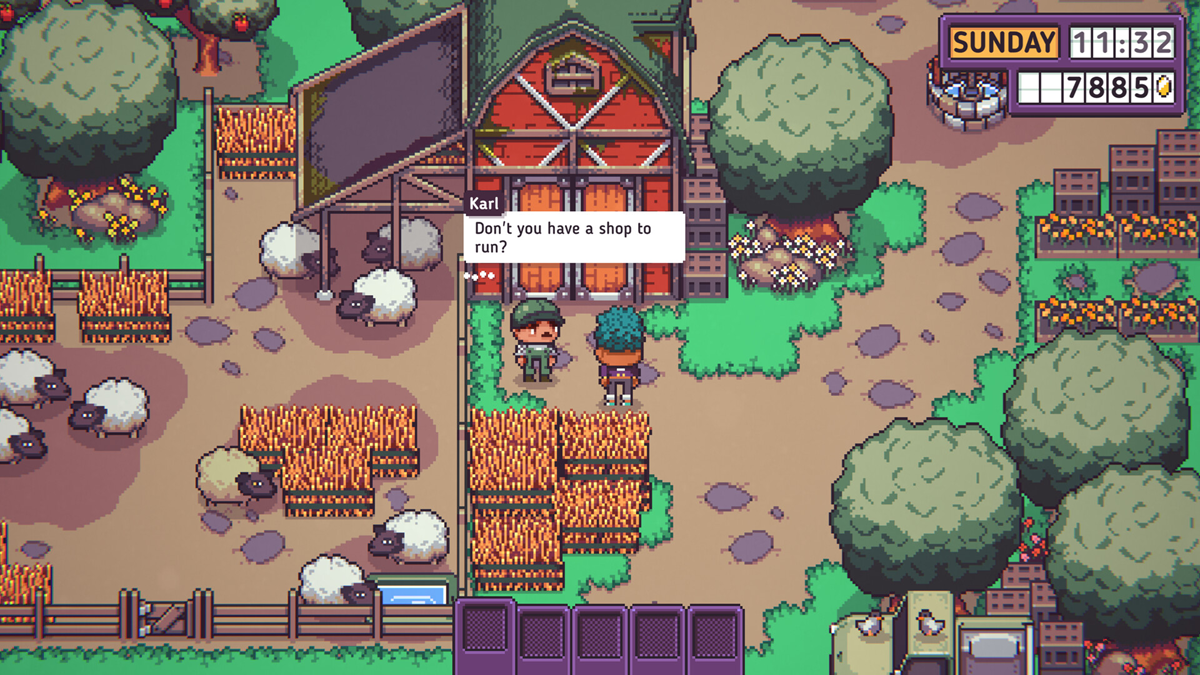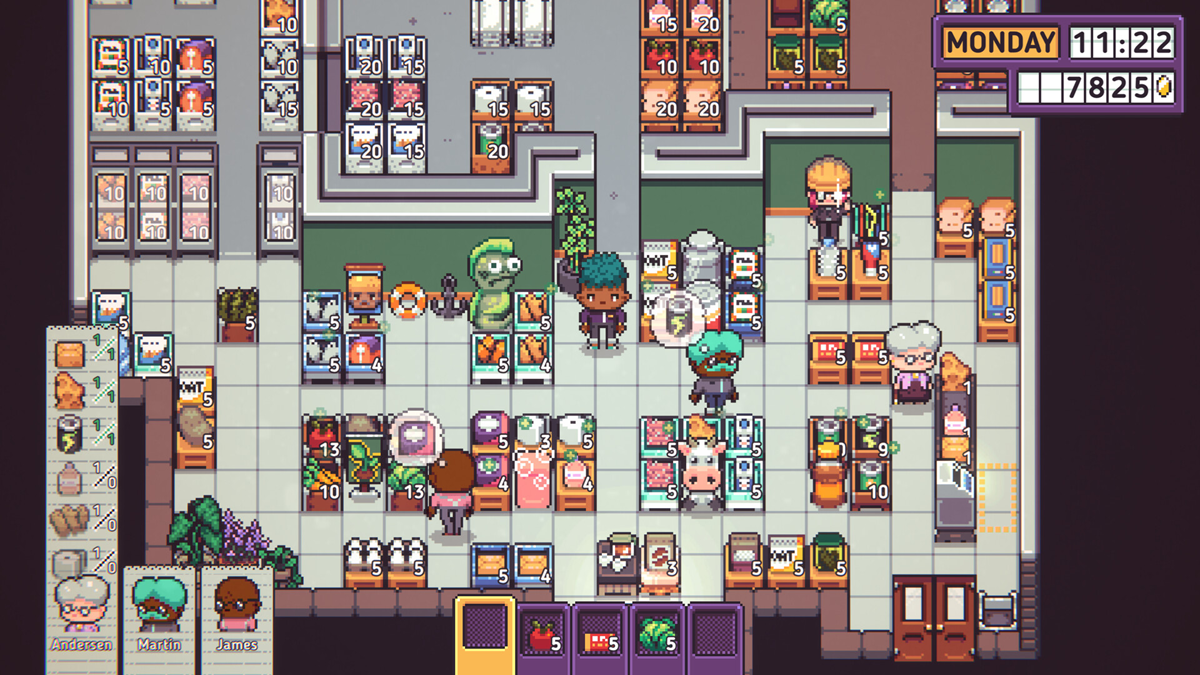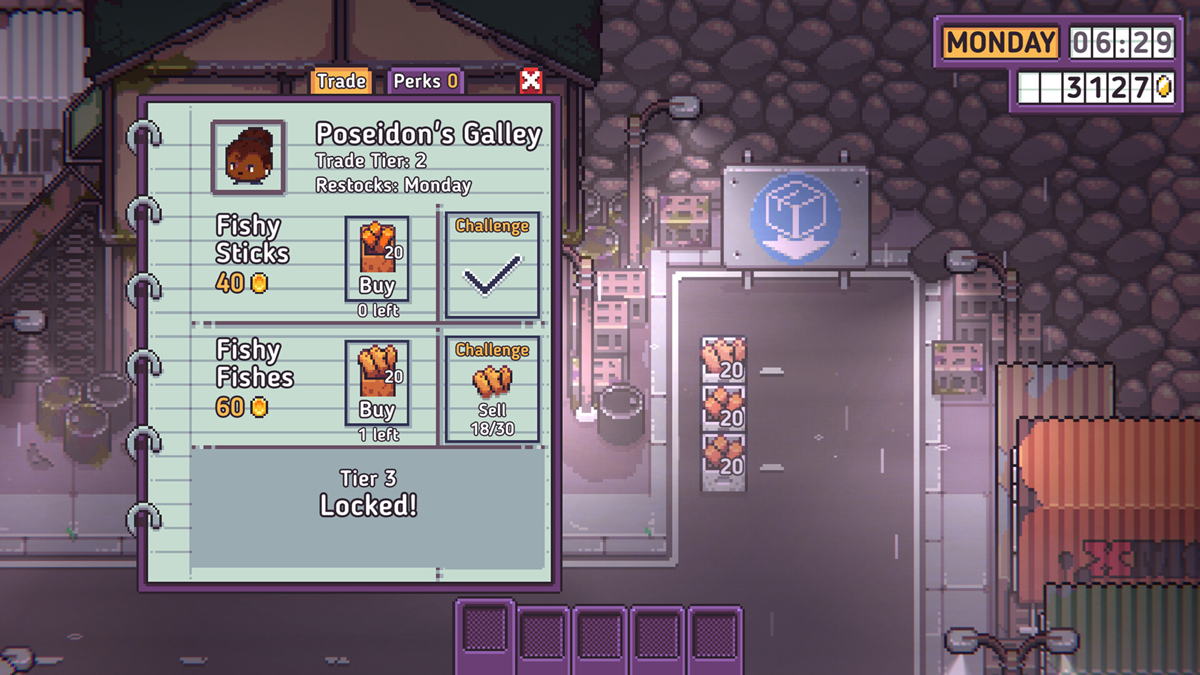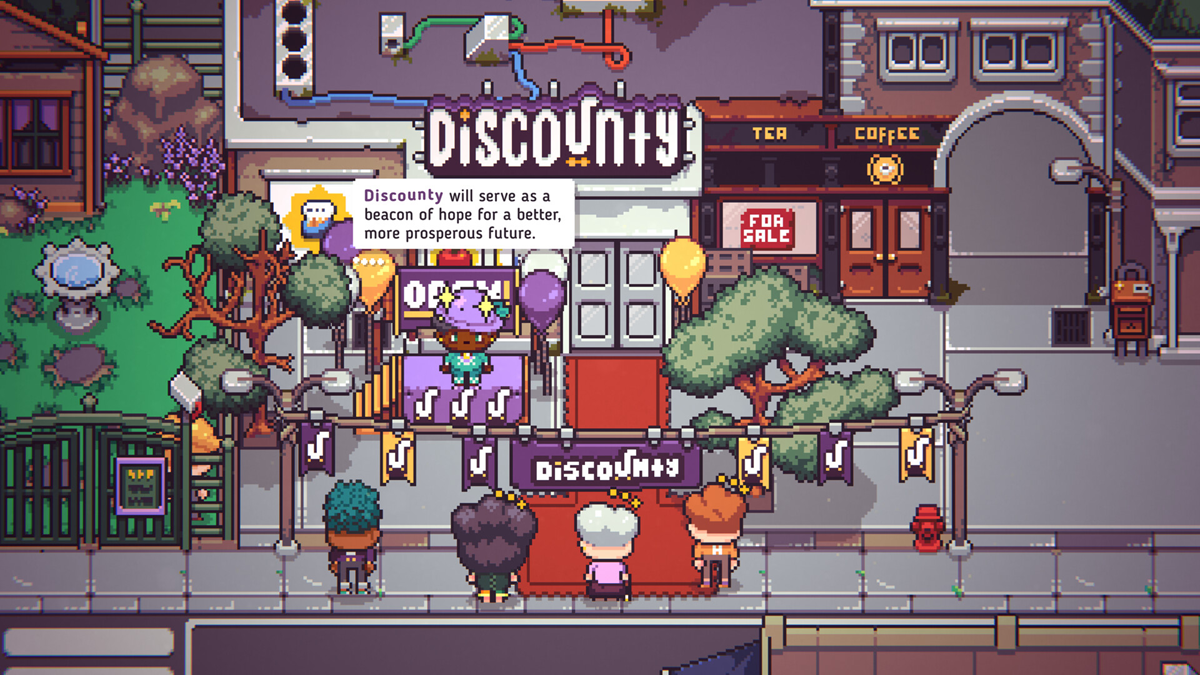This review follows Output Lag’s comprehensive review methodology.
About Discounty
- Developer
- Crinkle Cult Games
- Publisher
- PQube
- Release Date
- August 21, 2025
- Platforms
It started, innocuously enough, with a creaky bus ride into Blomkest. I stepped off onto cracked pavement and narrow docks, the salt sea smell in my lungs, clutching a single suitcase and the promise from my aunt that she’d built something extraordinary here. The town felt hollow, in disrepair: boarded windows, half-lit streetlamps, and silence in between the gull cries. It was a far cry from the cozy vibe I’d expected going into a sim about running a supermarket.
But once I pushed open the sliding doors of Discounty, flicked on the fluorescent lights, and heard the faint hum of refrigeration, everything fell into place. There is a certain satisfaction in watching aisles fill, hearing the beeps of a register, and watching customers’ foot traffic flow (or bottleneck) based on your shelf arrangement. On PC especially, where the cursor is precise and your mouse lets you reposition wares, I found myself slipping into a daily rhythm of logistics, small politics, and creeping existential dread. The world around Discounty is sweet, but not soft.

Running the Store
At its heart, Discounty is a management sim disguised as a “cozy” game. You begin nearly alone, playing the role of the shopkeeper for your aunt’s Discounty chain. She’s moved in, rebranded a failing store, and put you in charge. The locals aren’t thrilled. Your job is to make Discounty indispensable by ordering stock, restocking shelves, setting prices, maintaining floors, and serving customers with speed and care.
On PC, interaction is smooth: drag-and-drop shelving, click to reorder stock, or grab empty crates and shift them. In my early runs, I mispriced a carton of milk by one cent and watched customers walk past it, grumbling. Later, I unlocked a scanner tool which simplified one aspect of checkout, but until then, each transaction required manual keypad input, which felt like a mini puzzle under pressure. The faster you get those inputs right, the less the queue snarls.
Where many shop sims let you automate everything, Discounty leans into manual work. You’re present for each day (six days a week, eight hours a day), and the afternoon might be swallowed by cleaning drips, chasing out rats, juggling deliveries, or shifting layout when certain items refuse to sell. The more you succeed, the more tools, inventory, and layout options open—but also constraints. Customer expectations rise, demands diversify, and margins thin.
Because I was playing on PC, the UI scaling and tooltip clarity were generally excellent. I could zoom out to survey my entire floor, or zoom in to tweak individual shelf placement. Transitioning between shop view and town map (to accept quests or talk to locals) never felt janky. A few times I struggled with click-detection when items overlapped or characters blocked interaction zones, but those moments were rare.

A Story about Commerce
One of Discounty’s surprising strengths is how it weaves narrative tension into its store sim. From day one, the game gives hints that your aunt’s motives are not entirely benevolent. You’re drawn into regional politics, environmental disputes, encroaching corporate interests, and more. The townsfolk aren’t caricatures in the game either; they have grudges, secrets, ambiguous loyalties. As I negotiated deals with neighboring producers, mediated conflicts between residents, and uncovered shady bargaining done in back rooms, the sunny pixel art veneer cracked.
Sometimes the game leans heavy-handed: I felt the push to expand, to push margins, to close smaller “inefficient” vendors. Moments came during late quests when I had to choose whether to side with a struggling local shop or push them into folding so Discounty could absorb their market. Those choices felt weighty, especially when I’d spent hours building goodwill with that same shop’s owner.
Yet the narrative and gameplay don’t always sync. I hit spots where a quest would be locked behind having X stock level or revenue, but that felt more like artificial gating than drama. Some dialogue repeated (especially when revisiting side characters) and certain subplots never got full resolution by the campaign’s end.
Still, I appreciated that Discounty resisted being entirely comfortable. It lets you feel uncomfortable about expansion, consumption, and how your success can damage the broader community.

The Emotions of Running a Store
Discounty is clever and contrasting. It invites you to settle into the satisfying hum of store life, then gradually reveals claws. In one playthrough, I spent an entire “off day” chasing a storyline about polluted water near Blomkest’s docks. I hauled crates to a supplier, negotiated with a town councilor, then came back to the shop shaken, worrying that I’d diverted time from restocking perishables. The juxtaposition of macro community stakes and micro shelf management is what lifts it beyond “just another cozy sim.”
By the time I reached the end—or at least the narrative’s final chapter—I felt both accomplished and uneasy. The town was healthier, Discounty more central, but I couldn’t fully shake that some relationships I’d neglected were now fractured. That tension lingered.
It’s not perfect: some quests feel underbaked, dialogue loops, and certain gating could be smoother. But on PC, it’s polished, responsive, and compelling. The way it forces you to juggle empathy and profit, community and expansion, is rare in this genre. I’d recommend Discounty to fans of management sims who want something with bite. Let it lull you in, and then let it surprise you.
This review is based on a retail build of the game provided by the publisher.




